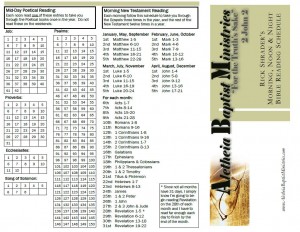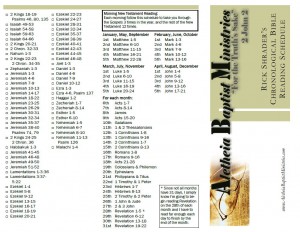GPS – The Pattern of Complementarity
by Rick Shrader

Complementarity is an old term that has come back into common usage. In the sense of a family or a marriage, it means that husband and wife are of equal value before God but have different roles in marriage. The contrary view is called egalitarianism, used by most feminists, which sees husbands and wives as equal both in value and in roles. Complementarity, then, describes a biblical relationship between husband and wife that blends two people, two genders actually, into “one flesh.” Andreas Köstenberger described it this way: “The biblical model for marriage is that of loving complementarity, where the husband and wife are partners who value and respect each other and where the husband’s loving leadership is met with the wife’s intelligent response” (God, Marriage, and Family).
I say complementarity is an old word because it has been in the dictionary a long time. “1: Serving to fill out or complete. 2: Mutually supplying each other’s lack. 3: Relating to or constituting one of a pair of contrasting colors that produce a neutral color when combined in suitable proportions” (Webster’s Seventh). That definition is compatible with the biblical definition. When man and woman were made in innocence in the garden, Adam described Eve this way: “This is now bone of my bones and flesh of may flesh; she shall be called woman” (Gen 2:23). Then God added, “Therefore a man shall leave his father and mother and be joined to his wife, and they shall become one flesh” (2:24). Or, as Webster’s puts it, two colors combined into one, in suitable proportions.
This combining of the man and the woman in marriage does not destroy the divine image and value in either person, neither does it destroy the headship of the man and the submission of the woman. Rather, it enhances both because this is the way God made us. As head, the man desires to lead in a godly and loving way, “as Christ is head of the church” (Eph 5:23), and desires the church to be all it should be. So the husband desires to lead the wife to be all she should be. In response, the wife desires for her husband to lead in a godly way so that she can be the helper and partner God created her to be. Christ is the head of every human being (1 Cor 11:3), and therefore every man and woman desires to fulfill the role given him or her for the glory of God.
The challenges in our egalitarian culture are great. Today’s world looks at almost any leadership and authority as abusive and dictatorial. It also sees any submissive attitude as cowering and apprehensive. Therefore we see little respect for almost any two-tiered arrangement whether government/citizen; teacher/pupil; employer/employee; parents/children; and especially husband/wife. The rebellion against authority has spread to almost every area of our culture.
This much is true, the fall into sin distorted the husband/wife complementarity which God created. Adam and Eve’s sin resulted in the wife desiring to rule over the husband and the husband responding by ruling harshly over the wife (Gen 3:16-20). From the beginning it was not this way. Faith in Christ will bring back the original purpose for men and women, for husbands and wives, for church leaders and parishioners, and even for governments and citizens. But complementarity is especially appropriate for the marriage covenant. When Jesus referred to the Genesis account He added these words, “So then, they are no longer two but one flesh. Therefore what God has joined together, let not man separate” (Matt 19:6). Don’t let an unbelieving culture deprive the marriage of its God-intended complementary roles.
The Shrinking Ministry
Last August (2022) I wrote an article which I never printed. I had titled it “The Shrinking Ministry” and I gave it to a number of pastoral friends because we had been discussing the growing problem of churches not being able to find a pastor or closing altogether. I read articles, books, and listened to messages. I bantered back and forth with good men about this need. I wrote something but left it alone. Recently I have been involved again with many pastors, churches, and laymen concerning this problem and need. I am going to reprint my thoughts in a few installments in this section of GPS.
The Shrinking Ministry, Part 1.
There have been a number of articles, books, and statistics shared recently that have highlighted the fact that the number of pastors, missionaries, and full-time Christian workers is declining in the 21st century. Churches find it difficult to locate or call new ministers. Mission agencies report that their numbers are shrinking every year. Schools at all levels are smaller with fewer students in each one. George Barna published an article titled, “The Aging of America’s Pastors” in which he showed that there are more pastors over the age of 65 than under the age of 40. In 1968 55% of pastors were under 45 years old, but by 2017 only 22% were under 45.
In the Spring ’22 edition of The Baptist Bulletin, Mel & Kristi Walker gave 6 reasons for the decline including the price of theological education, Covid burnout, inward-focused churches, a lack of motivation, family opposition to ministry, and the difficulty of ministry. In the Summer issue, Brandon Crawford also gave 6 similar reasons adding the demographic challenge of waning veterans and veteran benefits, and the ecclesiastical challenge of smaller churches with smaller salaries and opportunities. Each of these articles referenced Woodrow Kroll’s 2002 book, The Vanishing Ministry in the 21st Century (the 1991 edition was about the 20th century). After reading the book, I was impressed by Kroll’s insight and predictions of a vanishing ministry from so many years ago. During these years Kroll was president and teacher of Back to the Bible Radio Program and former president of Practical Bible College (now Davis College, Binghamton, NY). Kroll lays much of the blame on the increasing secularization of Bible colleges, the lack of emphasis for commitment at Christian schools, and the “upward mobility” of Christian families which discourages youth from ministry.
I found these and other concerns about the shrinking ministry very helpful, insightful, and concerning. I am 72 years old and have been in ministry for about 50 years. When I entered Bible college in 1968, all Bible colleges were full with not enough housing and classroom space to meet the need. When I entered seminary in 1972, there were 100 male students (plus 2 girls, one of whom I was fortunate to marry) of which the great majority entered full-time ministry. As a seminary student there were many opportunities to serve in local churches and I served as a youth pastor and interim pastor during those early years. Throughout my years of ministry I have been privileged to teach in Bible colleges and serve on Bible college and seminary boards. I have been pastoring since 1985. I’m simply saying that my generation has seen a lot come and go. I want to add a few of my own observations about the problem of shrinking ministry and then join these men and others with some possible solutions. (To be continued)
Ken Ham on “Trouble and Strife” & “Billy Lids”
I had to laugh with Ken Ham when he included this example of Australian slang in his book on parenting.
“In Australia, we have an odd phenomenon called ‘rhyming slang.’ We substitute a word with another word or phrase that rhymes with the original word, and understand it to mean the same thing as the original. Confused? Let me give you a few examples: The rhyming slang for the word ‘wife’ is ‘trouble and strife.’ The rhyming slang for the word ’road’ is ’frog and toad.’ The rhyming slang for ‘look’ is ‘Captain Cook,’ and the rhyming slang for ‘kids’ is ‘billy lids.’ (A ‘billy lid’ is the cover of a can used for boiling water over a fire for making a cup of tea).
“If I wanted to say, ‘My wife, children, and I are going to have a look at the road,’ using rhyming slang, I would say, ‘The trouble and strife, the billy lids, and I are going to take a Captain Cook at the frog and toad.’”
(from his book, Raising Godly Children in an Ungodly World, p. 218)






